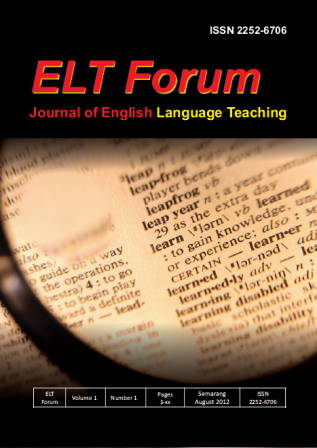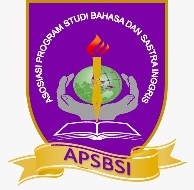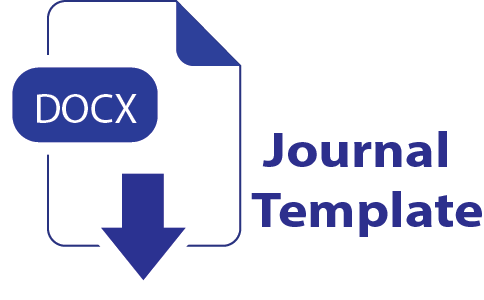THE USE OF PROBLEM BASED LEARNING TO IMPROVE STUDENTS’ SPEAKING ABILITY
Abstract
Senior high school students are expected to have a good speaking skill, meanwhile their ability to speak English is very low especially in term of fluency. Therefore, teachers need an alternative method to teach speaking skill that is called Problem based Learning. The objective of this study is to know the application of problem based learning as teaching method in improving students’ speaking ability and students’ achievement in speaking English. The action research was carried out in some steps. Those steps were pre-elimination test, conducting the cycles starting with planning, acting, observing, reflecting, and post-test. As data collection instruments, I used observation sheets, questionnaire, interview, and self and peer assessment of the students. The implementation of this method was reflected in the classroom activity, students self and peer assessment, questionnaire, interview, and observation sheets. The result of the study showed that there were significant improvements of students’ speaking ability after being taught by problem based learning. They also enjoyed the activities in class by having a discussion, sharing, and cooperation with their friends. In addition, the students gave positive opinion, response, and interest toward the implementation of problem based learning method. Therefore, the students’ speaking ability was increased. Based on the result above, it can be concluded that this method gave positive contribution to the improvement of the students’ speaking ability. This method is beneficial to help the students to learn to speak English in more enjoyable way.
References
Abdalla, Muhammed Elhasan & Abdelrahim Mutwakel Gaffar. 2011. The Seven Steps of PBL implementation. KSA: Jazan University.
Burns, Anne. 2010. Doing Action Research in English Language Teaching. New York: Roudledge.
Florez, Mary Ann C. 1999. Improving Adult English Language Learners’ Speaking Skills. Available at
www.cal.org/caela/esl_resources/digests/speak.html.
[accessed 07/01/2014]
Illinois Mathematics and Science Academy. 2008. Problem Based Learning Matters. Aurora, IL: IMSA. [online]. Available at
http://pbln.imsa.edu/resources/PBL_Matters.pdf
[accessed 12/01/2014]
Raine, Derek & Sarah Symons. 2005. Possibilities: a Practies Guide to Problem Based Learning in Physics and Astronomy. UK. University of Hull.
Tai, Gillian Xiao Lian & May Chan Yuen. 2007. Authentic Assessment Strategies in Problem Based Learning. Singapore: Journal Thornbury.
Scott. 2005. How to teach speaking. New Jersey: Pearson Education ESL.
Thornbury, Scott. 2005. How to teach speaking. New Jersey: Pearson Education ESL.
Yew, Elaine H. J. 2009. Process of Problem Based Learning. Singapore: Ruby Printing pte ltd. [Online]. Available at http://onlinelibrary.wiley.com/doi/10.1111/j.1365-2923.2011.04035.x/abstract
[accessed 09/01/2014]



_.jpg)
_.jpg)




